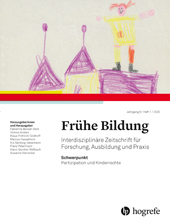Partizipation aus der Perspektive von Kindern
Abstract
Zusammenfassung. Bildungsteilhabe und Partizipation gelten mittlerweile als Kernbegriffe der aktuellen bildungspolitischen Diskussion um Inklusion. Dabei meint Partizipation explizit die Möglichkeit für Kinder, aktiv an der Gestaltung ihrer Lebens- und Lernerfahrungen teilzuhaben (Prengel, 2016). Der vorliegende Beitrag knüpft an dieses Konzept an und stellt Ergebnisse einer Fallstudie vor, die sich insbesondere mit der Sicht der Kinder zum Thema Partizipation und Wohlbefinden in der Kindertageseinrichtung beschäftigt. Im Rahmen des von der Europäischen Union geförderten Projektes „ISOTIS – Inclusive Education and Social Support to Tackle Inequality in Society“ wurden zehn Kinder im Alter von vier bis sechs Jahren aus einer Berliner Kindertageseinrichtung mit einem hohen Anteil an Familien mit Migrationshintergrund über Fokusgruppen und malbegleitete Gespräche dazu befragt, wie sie mit Verschiedenheit umgehen und welche Ansprüche sie selbst an eine gute Kindertagesbetreuung haben. Die Ergebnisse zeigen, welch eine bedeutende Rolle Partizipation für das Wohlbefinden der Kinder zu haben scheint. Frei zugängliche Spielmöglichkeiten und Materialien für die kreative Gestaltung, Mitbestimmung in der Gestaltung und Nutzung von Räumen sowie ein Tagesablauf, der weitestgehend individuelle Gestaltung zulässt, sind Aspekte, welche die Kinder als für sie bedeutsam beschreiben.
Abstract. Participation in education is a core concept in the current educational policy debate on inclusion. Participation explicitly means the possibility for children to actively participate in learning experiences (Prengel, 2016). The present article follows on from this concept and presents the results of a case study that deals in particular with the view of children on the topic of participation and well-being in settings of early childhood education and care (ECEC). The case study is part of the project “ISOTIS – Inclusive Education and Social Support to Tackle Inequality in Society” funded by the European Union. Ten children from an ECEC in Berlin setting with a high proportion of children from a migrant background were asked about their perception of themselves in their setting via focus groups and guided conversations. Question was, how they deal with diversity and what expectations they have of qualitative ECEC setting. The results show what an important role participation seems to play for the well-being of children. Freely accessible play opportunities and materials for creative design, co-determination in the design and use of rooms, as well as a daily routine that largely permits individual design, are aspects that the children describe as important for them.
Literatur
(2013). Stichwort: Auswirkungen frühkindlicher institutioneller Betreuung und Bildung. Zeitschrift für Erziehungswissenschaft , 16 , 237 – 275. https://doi.org/10.1007/s11618-013-0357-5
, (2007). IGLU 2006. Lesekompetenzen von Grundschulkindern in Deutschland im internationalen Vergleich. Münster: Waxmann.
(2013). Ethographie: Die Praxis der Feldforschung . Stuttgart: UTB.
(2007).
Interviewing children . In G. Mac NaughtonS. A. RolfeI. Siraj-BlatchfordEds.), Doing Early Childhood Research. International Perspectives on Theory and Practice (pp. 162 – 178). Buckingham: Open University Press.(2001). Partizipation – Ein Kinderspiel? Beteiligungsmodelle in Kindertagesstätten, Schulen, Kommunen und Verbänden. Herausgegeben vom Bundesministerium für Familie, Senioren, Frauen und Jugend. Berlin: DJI.
Bundesamt für Migration und Flüchtlinge (2017). Aktuelle Zahlen zu Asyl. Ausgabe: September 2017. Verfügbar unter: http://www.bamf.de/SharedDocs/Anlagen/DE/Downloads/Infothek/Statistik/Asyl/aktuelle-zahlen-zu-asyl-september-2017.pdf?blob=publicationFilBundesministerium für Migration und Flüchtlinge (o. J.). Glossar der Begriffe. Migrationshintergrund (Definition) . Verfügbar unter: https://www.bamf.de/DE/Service/Left/Glossary/_function/glossar.html?lv3=319854444(Hrsg.) (1998). Rechte der Kinder. Baltmannsweiler: Schneider Verlag Hohengehren.
(1970). The Reserach Act in Sociology. A Theoretical Introduction to Sociological Methods . Chicago: Butterworth.
(2005). We can decide what to play! Children's perception of quality in an Icelandic Playschool. Early Education and Development , 16, 469 – 488.
(1995). Writing ethnographic fieldnotes . Chicago: University of Chicago Press.
(2011). Triangulation. Eine Einführung (3. aktual. Aufl.) (Qualitative Sozialforschung, Bd. 12) Wiesbaden: Springer.
(2009).
Ungleichheiten der Inanspruchnahme öffentlicher frühpädagogischer Angebote. Einflussfaktoren und Restriktionen elterlicher Betreuungsentscheidungen . In H.-G. RoßbachH.-P. BlossfeldHrsg., Frühpädagogische Förderung in Institutionen. Zeitschrift für Erziehungswissenschaft (Sonderheft 11, S. 11 – 28). Wiesbaden: VS.(2013). Life with and without coding: Two methods for early-stage data analysis in qualitative research aiming at causal explanations. Forum Qualitative Sozialforschung / Forum Qualitative Social Reseach, 14 (2), Art. 5. Verfügbar unter: http://www.qualitative-research.net/index.php/fqs/article/view/1886/3529
(2010). Experteninterviews und qualitative Inhaltsanalyse als Instrumente rekonstruierender Untersuchungen (4. Aufl.). Wiesbaden: VS.
(Hrsg.) (1999). Aus der Perspektive von Kindern? Zur Methodologie der Kinderheitsforschung . Weinheim: Juventa.
(2007). Qualitative Inhaltsanalyse. Grundlagen und Techniken (UTB für Wissenschaft Pädagogik, 9. Aufl.). Weinheim: Beltz.
(2010).
Qualitative Inhaltsanalyse . In G. MeyK. Mruck (Hrsg.), Handbuch Qualitative Forschung in der Psychologie (S. 601 – 613). Wiesbaden: VS. https://doi.org/10.1007/978-3-531-92052-8_42(2003). Lehrbuch der Gesundheitsförderung. Umfassend und anschaulich mit vielen Beispielen und Projekten aus der Praxis der Gesundheitsförderung . Köln: BZgA.
(2017). Kita-Qualität aus Kindersicht. Eine Studie des DESI-Instituts im Auftrag der Deutschen Kinder- und Jugendstiftung. Berlin: Deutsche Kinder- und Jugendstiftung & Institut für Demokratische Entwicklung und Soziale Integration.
(2019). ISOTIS (Inclusive Education and Social Support to Tackle Inequalities in Society) D2.4 Technical Report on the Child interview study. Children's views on inclusion at school. ISOTIS D2.4 Report.
(2012). Visualising children's participation in research: Lego Duplo, rainbows and clouds and moodboards. International Journal of Social Research Methodology , 15 (2), 135 – 148. https://doi.org/10.1080/13645579.2012.649410
(2016). Bildungsteilhabe und Partizipation in Kindergartentageseinrichtungen. Eine Expertise der Weiterbildungsinitiative Frühpädagogische Fachkräfte (WiFF) (Inklusion, Bd. 47). München: Deutsches Jugendinstitut e. V.
(2012). Having, loving, and being: children's narrated wellbeing in Finnish day care centres. Early Child Development and Care, 182 , 345 – 362.
(1990). Fieldnotes: Makings of Athropology . Ithaca: Cornell University Press.
(2001). Children's conceptions of participation and influence in preschool: A perspective on pedagogical quality. Contemporary Issues in Early Childhood, 2 , 169 – 194.
Statistisches Bundesamt (2017). Statistiken der Kinder- und Jugendhilfe. Kinder und tätige Personen in Tageseinrichtungen und in öffentlich geförderter Kindertagespflege. Verfügbar unter: https://www.destatis.de/DE/Publikationen/Thematisch/Soziales/KinderJugendhilfe/TageseinrichtungenKindertagespflege5225402177004.pdf?__blob=publicationFileUnited Nations Department of Economics and Social Affairs (UNDESA) (2007). Final Report of the Expert Groupt Meeting on Creating an Inclusive Society. Practical Strategies to Promote Social Integration. Paris, France, 10. – 13. September 2007.(2008).
Wie Sprache das Denken, Lernen und Wissen von Kindern beeinflusst . In H. Rieder-Aigner (Hrsg.), Zukunftshandbuch Kindertageseinrichtungen. Bildungsarbeit im Mittelpunkt (59. Aufl., S. 1 – 16). Regensburg: Walhalla.



